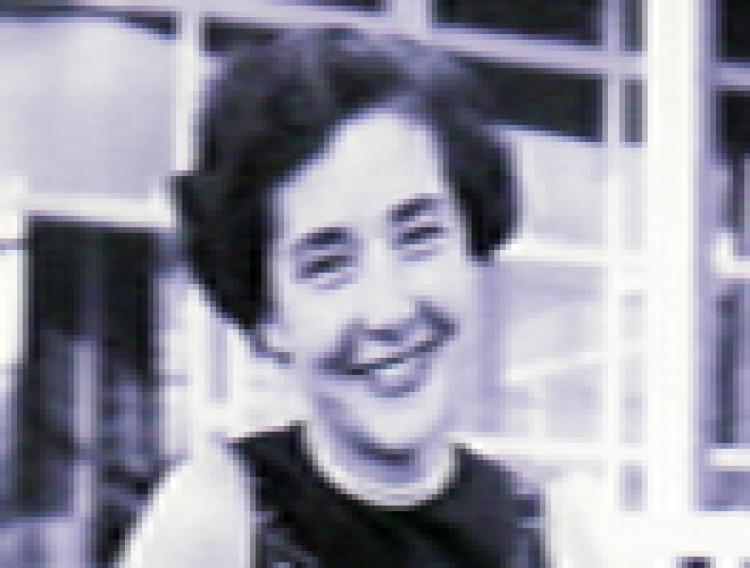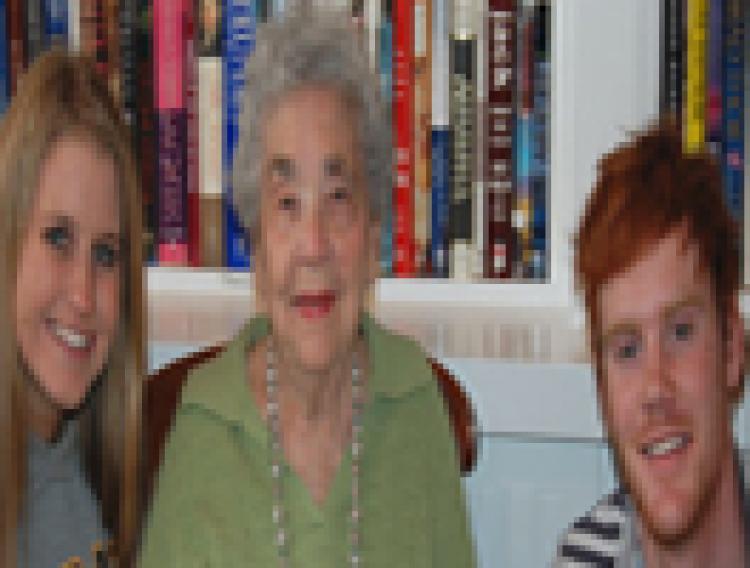Pearl Hoffman
Pearl Hoffman was born in Chicago on January 19, 1923. She was married in 1943 to Irv Hoffman. They have three children, four granddaughters, and one grandson, and they all live happily ever after.

Click image to enlarge
The May Day Case
A few of my friends and I decided to go to the Democratic convention in Chicago, which was in 1945, during the fourth term election of Roosevelt’s presidency. He was, in fact, the first and only president to run for more then two terms. Congress permitted this to happen because our country was in the middle of a very serious war and we were not willing to change presidents in the middle of a war. After Roosevelt died, Congress passed the law limiting the number of terms a president can run to two.
We didn’t have passes to enter, and no one was allowed on the floor of the convention unless they were a delegate and had a pass indicating so. We kept our eyes on the floor looking for someone who had carelessly dropped their badge, and finally we found enough so that each of us was able to enter. We had heard that Roosevelt was planning to replace Vice President Henry Wallace because the Democratic decision makers thought him to be too liberal. We were all supporters of Wallace and started a demonstration. We paraded around the room chanting and supporting Wallace.
After a short time, some of the veteran delegates, who had been to many conventions before, smiled at us benignly, and said, “Children, this looks like great fun, but the decision was already made last night in a smoke-filled room.” But the delegate did not indicate who they had selected to take Wallace’s place and that information would not be revealed until later. We were disappointed by this statement, but we chose not to believe it. It eventually turned out to be true, and the choice was Harry Truman, who actually became an excellent vice president, and later president. Surely they did not expect Roosevelt to die in this term or else Truman may not have been elected because he was such a little known senator, and an unremarkable, unobtrusive man. It was not that we didn’t like Truman; we just hadn’t heard of him before, which was why my friends and I were in support of Wallace.
For years people did not notice that because of Roosevelt’s polio he was unable to stand on his own, so his son or someone else would help him to the podium. Roosevelt had a very dominating mother who wanted him to retire, while Eleanor, his wife, disagreed and encouraged him to keep going. There is a memorial to him in Washington D.C. where he is sitting, which helped the nation realize that it didn’t matter if Roosevelt could walk because his brain was always sharp and he was a great president.
Adjutant General’s Office
I knew that politics was one of my main interests. But first I went to Washington to help win the war. I worked for the Adjutant General’s Office (the government’s lawyers). I met my husband around that time and when he went overseas, I got a job as a topographer at the Army Maps Service, where I worked all during the war compiling air charts for our pilots. This branch of the Maps Service compiled and printed air charts for our pilots. This branch of the Maps Service compiled and printed air charts for the pilots, which showed them the rivers, the terrain, elevations, and landmarks such as cities and parks, so that they could look down and know where they were. I went home to Chicago, baked pies for the USO, continued to work for the Maps Service in Chicago, and worked for them after the war in Washington.
After I left the Maps Service, I knew I needed something to do and so I went to work for the American Civil Liberties Union. The ACLU’s mission was to legally defend the Constitution and the Bill of Rights from abuses by the government. They are cases where the citizens have a legitimate civil rights complaint. My job was to find these cases among the thousands of requests we got each year. When I arrived the ACLU office had a haphazard system in which requests were sent to volunteer lawyers. No one kept track of where the cases were and who had them. After about a year I had it organized and I had a small staff, mostly students from American University.
People often thought that we could solve all problems, but we only took civil liberty issues. I had a file labeled “thank you notes and threats” because many people either liked us or hated us. Our cases were mostly mundane, but every once in a while we found cases with a large impact. Just before I left, our office got a million-dollar check from the District of Colombia government for a 2002 case where citizens with permits were arrested for protesting. The police have learned nothing since then.

Click image to enlarge
Our biggest case in 1971 was called “May Day,” where the police had unlawfully gathered up and arrested 13,000 citizens. Among them were people on the street passing by or going to work, some just standing and watching. THIS WAS THE LARGEST SWEEP ARREST IN AMERICAN HISTORY. So many people were arrested that they were put in the football stadium, in the coliseum, and different police precincts under terrible conditions with little water or food, no medical assistance, and few toilets. Many were held as much as 60 hours until ACLU lawyers and others, including judges, got them released after posting bonds.
Unfortunately, we did not succeed in getting damages for most of them, but we did get the arrest records expunged and we got damages ranging from $1,000-$3,000 for those who were arrested on the capital steps where they were being addressed by Representative Dellums and other congressmen. This case was right out of the First Amendment, which reads in part, “On the rights of people to peacefully assemble and petition their government for a redress of grievances.” We got the bonds for all 13,000 returned except for about 60, which took us until 1980, nine years later.
After 33 years with the ACLU, which was time I consider well spent, I left with regrets just before coming to Boulder.

